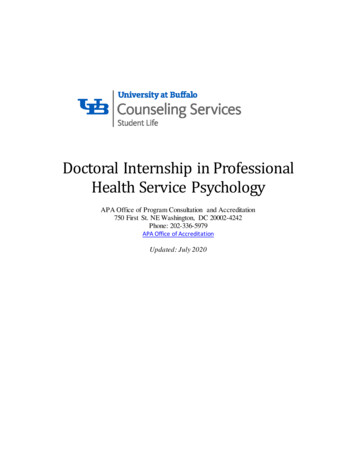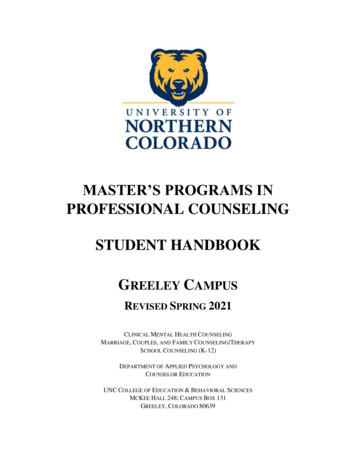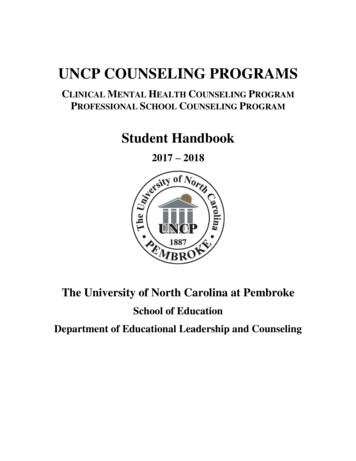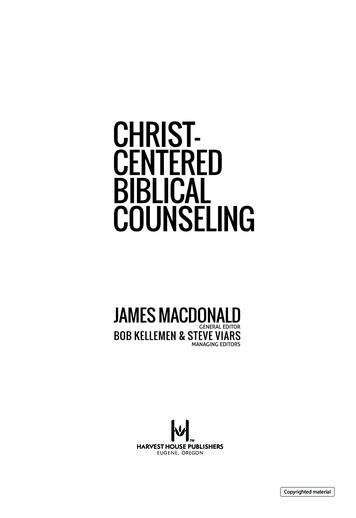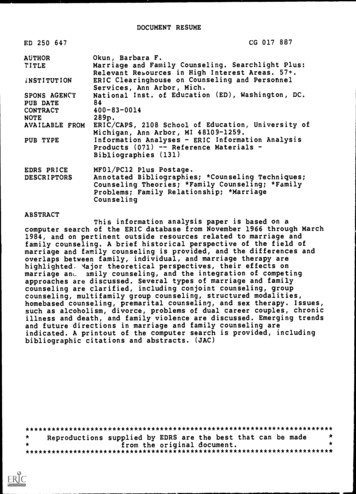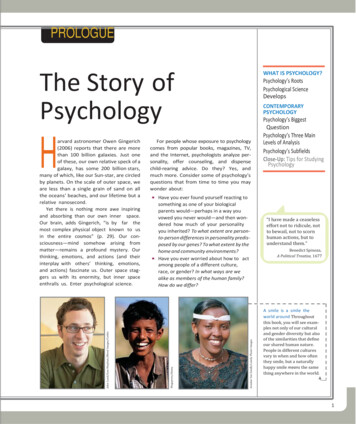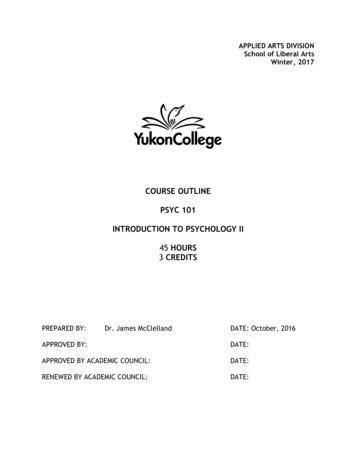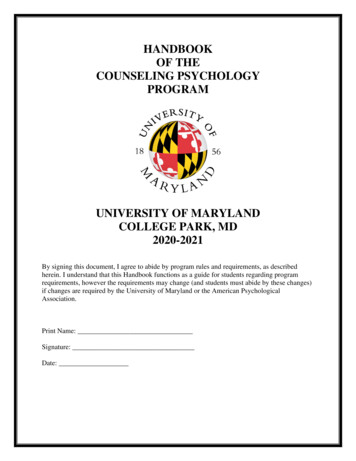
Transcription
HANDBOOKOF THECOUNSELING PSYCHOLOGYPROGRAMUNIVERSITY OF MARYLANDCOLLEGE PARK, MD2020-2021By signing this document, I agree to abide by program rules and requirements, as describedherein. I understand that this Handbook functions as a guide for students regarding programrequirements, however the requirements may change (and students must abide by these changes)if changes are required by the University of Maryland or the American PsychologicalAssociation.Print Name:Signature:Date:
HANDBOOK FOR STUDENTS AND FACULTYCOUNSELING PSYCHOLOGY PROGRAMUNIVERSITY OF MARYLANDTABLE OF CONTENTSI.OVERVIEW OF THE PROGRAMA. Welcome to our program .5B. Nature of the program .5C. Faculty .5D. Qualifications of applicants and placements of graduates .6E. Data regarding program completion, costs, internship placement, attrition, andlicensure .7II.PROGRAM OF STUDYA. Curriculum and requirements: An overview .10B. Required coursework .11C. Policy on missing classes .14D. Sample program plan .14E. Exemption from courses .17F. Continuous enrollment.17G. Time limitation .17H. Disclosure of personal information .17I. Recording practicum/clinical hours .18J. Advising and registration issues .20K. Registration issues during internship .21L. Winter term enrollment .22III.BEYOND COURSEWORK: REQUIREMENTS AND EXPECTATIONSA. Research opportunities .24B. Guidelines for the master’s thesis .24C. Master’s thesis completed prior to enrollment in program .27D. Earning a master’s degree .27E. Externships .28F. Comprehensive examinations and portfolio .31G. Admission to candidacy .41H. Dissertation .41I. Nomination of thesis or dissertation committee .41J. Internship .44K. Petitions.47L. Continuous registration/leave policies applicable to post-candidacydoctoral students .47M. Policy for conducting counseling or research .48N. Guidelines for documents with confidential information .482
O. Professional development .50P. International student resources .50IV.EVALUATION OF STUDENT’S ACADEMIC AND CLINICAL PROGRESSA. Maintaining good academic standing .52B. Leave of absence policy .53C. Policy regarding termination of student status .53D. Dismissal policies .56E. Student grievance procedures .56F. Use of evaluative data from training partners external to the program .57V.ASPIRATIONAL MULTICULTURAL STATEMENT .58VIFACULTY OF THE COUNSELING PSYCHOLOGY PROGRAMA. Full-time faculty .60B. Additional faculty .61C. Adjunct faculty .64D. Emeritus professors .64VII.MISCELLANEOUS NOTESA. Student representatives to faculty meeting .65B. Student governance .65C. Assistantship guide.65D. Program rosters .65E. Program facilities .65F. Residency in the State of Maryland .66G. Fretz Scientist-Practitioner Award .66H. Scientist-Practitioner –Award for Social Justice Award .66Appendix I: DESCRIPTION OF COUNSELING PSYCHOLOGY COURSESA. PSYC 638 or EDCP 888 - Externship in Professional Psychology .67B. PSYC or EDCP 680 - Basic Didactic-Practicum in Counseling Psychology .68C. PSYC or EDCP 682 – Didactic-Practicum in Group Interventions .69D. PSYC or EDCP 685 – Didactic-Practicum in Counseling Supervision.70E. PSYC or EDCP 686 – Didactic-Practicum in Career Interventions .72F. PSYC or EDCP 690 - Research in Counseling Psychology I .73G. PSYC or EDCP 691 - Research in Counseling Psychology II .74H. PSYC or EDCP 692 - Assessment in Counseling Psychology I .75I. PSYC or EDCP 693 - Assessment in Counseling Psychology II .76J. PSYC or EDCP 695–Ethical and Professional Issues in Counseling Psychology.77K. PSYC or EDCP 697 – Multicultural Issues in Counseling Psychology .78L. PSYC or EDCP 698 - Advanced Didactic-Practicum in Counseling Psychology .79M. PSYC or EDCP 700 - Theories and Strategies of Counseling Psychology .803
Appendix II: FORMS FOR STUDENTS AND FACULTY IN THE COUNSELINGPSYCHOLOGY PROGRAM AT THE UNIVERSITY OF MARYLANDA. Emergency contact form .82B. Student folder checklist form .83C. Selecting or changing an advisor form .85D. Master’s thesis evaluation form .86E. Comprehensive exam grading form .87F. Cumulative and annual report form - Students .88G. Annual student evaluation form – Faculty .91H. Supervisor assessment of practicum and externship student progress form .92I. Approval of externship form.94J. Evaluation of externship/supervisor form.95Appendix III: SEXUAL HARRASSMENT GUIDELINES .97Appendix IV: GUIDELINES FOR FACULTY ADVISORS .99Appendix V: PROFESSIONAL LICENSURE DISCLOSURE .101Appendix VI: COUNSELING PSYCHOLOGY PROGRAM TIMELINE .103Counseling Psychology Website: http://www.counselingpsychology.umd.eduOur Ph.D. program in Counseling Psychology has been continuously accredited by the AmericanPsychological Association (APA) since 1953. Inquiries about the accreditation status of the CounselingPsychology Program can be made to the APA's Committee on Accreditation (CoA):American Psychological AssociationOffice of Program Consultation & Accreditation750 First Street NEWashington, DC 20002-4242Phone: (202) 336-5979; Fax: (202) 336-5978Email: apaaccred@apa.org; Website: http://www.apa.org/ed/accreditation/4
I. OVERVIEW OF THE PROGRAMA. WELCOME TO OUR PROGRAMWelcome to the doctoral program in counseling psychology at the University of Maryland! We lookforward to working with you during your education as a counseling psychologist and we are confidentthat you will make substantive contributions to our field in the years to come.B. NATURE OF THE PROGRAMOur counseling psychology program is administered collaboratively by the Department of Psychology(PSYC) and the Department of Counseling, Higher Education and Special Education (CHSE). Thecollaborative program is designed to enable students to become: (a) psychologists who are trained ingeneral psychology as a behavioral science, (b) competent in conducting research on a wide variety ofpsychological problems, and (c) competent in providing effective counseling. At all levels, ourcurriculum provides an integration of general psychology, research participation, and counselor training.Candidates should note that there is a strong expectation throughout the program for students to beactive in research. Those interested primarily in professional training, as opposed to scientist-practitionertraining, should consider other graduate programs. Our program is approved by the AmericanPsychological Association (APA); graduates of the program are eligible for certification and licensingexaminations for psychologists.In most respects, students have the same experience regardless of departmental affiliation. Students takevirtually all of their courses together, and receive the same high quality training in research and practice.However, some facets of the program differ for students housed in the two sides of the program. Forexample, CHSE and PSYC are located in different buildings, and students tend to spend more time inthe department with which they are affiliated. Students’ work space is usually assigned by theirdepartment, and students’ paperwork and bureaucratic processes are typically handled in theirdepartment. Also, the details of funding arrangements differ by department, as explained on ourfinancial information webpage. Also, there are a few differences in coursework based on the departmentin which students are housed (e.g., statistics courses). Despite these differences, we believe studentsdevelop a strong sense of connectedness across departments because of the cohort model on which ourjoint training program is based.C. FACULTYThe full-time counseling psychology faculty members are from the Psychology Department and theDepartment of Counseling, Higher Education and Special Education. The co-directors are JonathanMohr (PSYC) and Jioni Lewis (CHSE). The full-time faculty include Clara Hill, Derek Iwamoto,Jonathan Mohr, and Karen O’Brien from PSYC, and Dennis Kivlighan, Robert W. Lent, Jioni Lewis,and Roger Worthington from CHSE. The faculty is augmented by an associate professor in the SchoolCounseling program in the Department of Counseling, Higher Education and Special Education(Richard Shin), a lecturer in the Department of Psychology (Nazish Salahuddin), part-time or affiliatedfaculty from the University’s Counseling Center (Maria Berbery, Noah A. Collins, Yi-Jiun Lin, EricaMerson, David A. Petersen, Pepper E. Phillips, Chandni Shah), a research affiliate faculty member fromthe Department of Psychology Cognitive Neuroscience Laboratory (Cristina Risco), and additionalaffiliated faculty from the Department of Counseling, Higher Education and Special Education (EllenFabian and Paul Gold), and the Office of Diversity and Inclusion (Carlton Green). Other counselingpsychologists and adjunct faculty from the area provide periodic courses, workshops, and supervision.5
We represent a broad range of theoretical orientations: psychodynamic, cognitive-behavioral,humanistic, feminist, multicultural, and developmental. None of us consider ourselves to be orthodoxproponents of any one of those approaches, and in fact, we have a strong emphasis on training studentsin several major theoretical orientations. Biographical sketches of the counseling psychology faculty areprovided in a later section.D. QUALIFICATION OF APPLICANTS AND PLACEMENT OF GRADUATESWe usually accept three to six new students each year to maintain our small student-faculty ratio. Thisratio allows for high quality supervision of both research and professional training. Students are notrequired to visit the campus for an interview as part of the application process, although we invite thefinalists to participate in on-campus interviews. Our student body is diverse with respect to gender,gender identity, age, culture, race/ethnicity, sexual orientation, and geographic background (includinginternational status).Applicants are not required to have an undergraduate degree in psychology, but need to have a course ingeneral psychology, introductory statistics, and at least three other psychology courses (15 credits).Nearly all students who have entered our program in recent years have completed or are currentlycompleting their doctoral studies. Our most recent graduates have taken positions in academicdepartments, university counseling centers, veterans’ affairs medical centers or various research orpractice settings.Please refer to the following tables for additional information.6
E. DATA REGARDING PROGRAM COMPLETION, COSTS, INTERNSHIP PLACEMENT,ATTRITION, AND LICENSURETime to Completion for All Students Entering the ProgramOutcomeYear in which degrees were tal numberof studentswith doctoraldegreeconferred ontranscriptMean numberof years tocomplete theprogramMediannumber ofyears tocomplete theprogramTime ToDegreeRangesStudents inless than 5yearsStudents in 5yearsStudents in 6yearsStudents in 7yearsStudents inmore than 00011711100000047NOTE: For information about specific policies related to receiving credit for previous graduate work, pleasesee page 17 of this handbook. Depending upon the number of credits accepted from a student’s master’sprogram, that student may be able to complete this program in 5 years.Program CostsDescription2020-2021 1st- year Cohort CostTuition for full-time students (in-state) 8,772 (one 12 credit semester)Tuition for full-time students (out-of-state) 19,500 (one 12 credit semester)Tuition per credit hour for part-time students 731.00 for resident; 1,652 for non-resident 417.50 for 1 to 8 credits; 817.50 for 9 or more credits*University/institution fees or costs(two semesters; additional fees also apply for summer andwinter term classes if taken)Additional estimated costs (including room & food offcampus, personal expenses, books/supplies, 19,480transportation, etc.)NOTE: *Effective Fall 2017, the University of Maryland charges a fee of 125 per semester for allnewly enrolled, full time international students.All students are considered full-time and all currently have funding (fellowships or GA-ships) that range7
from approximately 18,000- 24,000 depending on a 9-month or 12 month/20 hours per weekappointment. Funding.includes tuition remission for 10-12 credits per semester and credits in eitherwinter term or summer term or both. Exceptions are that students on internships pay for 1.5 – 2.5 creditsduring internship (which will likely be out of state depending on where the student lives) withinternational students being required to be enrolled for 1 credit the summer their internship begins and 1credit the summer when internship ends (institutional fees can be waived if internship is off-campus)and 1 credit in the summer if participating in an externship if campus funding does not provide summertuition credits. Students with fellowships or assistantships receive subsidized health insurance.Students on assistantships or fellowships typically pay only the mandatory fees as most credits arecovered by the financial aid package. However, students should know that they may need to pay forsome credits during their doctoral program (e.g., during internship when students are typically offcampus and receiving a stipend from their internship site rather than from an assistantship; and, studentswith F-1 visas who will need to be enrolled during winter term or summers if they are taking requiredcourses if their assistantship or fellowship does not include winter term or summer tuition remission, orstudents whose assistantship or fellowship does not include winter term or summer tuition remission).Internship Placement - Table 1OutcomeStudents who obtainedAPA/CPA-accreditedinternshipsStudents who obtainedAPPIC memberinternships that werenot APA/CPAaccredited (ifapplicable)Students who obtainedother membershiporganization internships(e.g. CAPIC) that werenot APA/CPAaccredited (ifapplicable)Students who obtainedinternships conformingto CDSPP guidelinesthat were notAPA/CPA-accredited(if applicable)Students who obtainedother internships thatwere not APA/CPAaccredited (ifapplicable)Students who obtainedany internshipsStudents who sought orapplied for internshipsincluding those whowithdrew from theapplication process20102011N %20112012N %20122013N %Year Applied for Internship20132014201520162014201520162017N % N % N % N %20172018N %20182019N %20192020N 810051005655864585NOTE: *Three of the four students who did not get an internship in their first year applying received anAPA internship the following year8
Internship Placement - Table 2Outcome20102011N %20112012N %20122013N%20132014N %5655Students whosought or appliedfor internshipsincluding thosewho withdrewfrom theapplication processStudents whoobtained paidinternshipsStudents whoobtained half-timeinternships (ifapplicable)Year Applied for Studentsfor whomthis is theyear offirstenrollment(i.e. redon theirtranscriptsStudentsstillenrolled intheprogramStudentsno longerenrolledfor anyreasonother 0122013N%20132014N%4758Year of First 01170000LicensureOutcomeThe total number of program graduates (doctoral degreesconferred on transcript) between 2 and 10 years agoThe number of these graduates (between 2 and 10 yearsago) who became licensed psychologistsLicensure percentage2010 to 2018443784%9
III. PROGRAM OF STUDYA. CURRICULUM AND REQUIREMENTS: AN OVERVIEWStudents are expected to enroll full-time for the first five years. Many students also carry a 10 to 20 hourper week assistantship during the 9-month academic year, and others have a year-long assistantship.There usually are no summer didactic courses, and many students choose to focus on research duringtheir summers. Formal coursework is completed in residence and usually takes four years. Studentstypically use their fourth year to complete the comprehensive examination and any remaining classes.The dissertation and internship are usually completed in the fifth and sixth years. Students must have anapproved dissertation proposal prior to May 15th of the year of their applying for an internship.The curriculum provides for a set of courses and experiences oriented toward understanding patterns ofhuman functioning and the development of strategies for fostering human effectiveness. In recognitionof the diversity of program members, clients, and styles of effective functioning, the curriculum isarranged for students to develop a variety of competencies in scholarship, research, teaching, andcounseling. We encourage students to enroll in extra courses or research experiences based on theirinterests and goals.A background in general psychology includes selections from affective, biological, cognitive,developmental, and social aspects of behavior, as well as history and systems of psychology. Thecourses in counseling psychology include courses in professional issues (the history and development ofcounseling, ethics and legal issues), theories of counseling, career psychology, assessment, researchmethods, multicultural psychology, and didactic practica. It is important to note that our program is notfocused on psychological assessment. Students wanting additional experience beyond what the twocourses that are provided should pursue additional courses or experiences outside of our program suchas assessment-focused externships.Counseling practica are offered in the program, at the University of Maryland Counseling Center, andsometimes at off-campus agencies. Students are required to take Pre-Practicum (as a part of CounselingTheories), Basic, Advanced, Career, Supervision, and Group Practicum.Students are required to purchase professional liability insurance every year while in the program. Proofof such purchase should be turned in by September 30th each year (attached to the annual report formand submitted to the advisor and director of training on the side on the program where the studententered). Failure to submit evidence of enrollment in an insurance plan can result in the loss of goodstanding in or termination from the program.During the first 2-1/2 years, all students must complete an approved master’s research thesis. Apreviously completed master’s thesis from a previous university must be presented to the student’sadvisor by September 30 of the student’s first year, and reviewed by a committee of three facultymembers from the Counseling Psychology Program to be approved for the thesis. Approximately 60%of the empirical master’s theses completed elsewhere have been approved in the past.Students complete comprehensive exams after finishing the majority of their coursework and therequired thesis. The comprehensive exams often are taken prior to the beginning of the 7th semester inthe program, at least one full year before the internship begins. The comprehensive exams, as describedlater in this handbook, provide for the major assessment of students' acquisition and integration of thescientific and professional bases of counseling psychology.10
B. REQUIRED COURSEWORKCounseling Psychology CoursesPSYC 629 or EDCP 789- Clinical Laboratory/Advanced Topics in Counseling (variable credits)*PSYC 638 or EDCP 888 - Externship in Professional Psychology (variable credits)*PSYC or EDCP 680 - Basic Didactic-Practicum in Counseling Psychology (3 credits)*PSYC or EDCP 682 - Didactic-Practicum in Group Interventions (3 credits)PSYC or EDCP 685 - Didactic-Practicum in Counseling Supervision (3 credits)*PSYC or EDCP 686 - Didactic-Practicum in Career Interventions (3 credits)*PSYC or EDCP 690 - Research in Counseling Psychology I (3 credits)PSYC or EDCP 691 - Research in Counseling Psychology II (3 credits)*PSYC or EDCP 692 - Assessment in Counseling Psychology I (3 credits)PSYC or EDCP 693 - Assessment in Counseling Psychology II (3 credits)PSYC or EDCP 695 - Ethical and Professional Issues in Counseling Psychology (3 credits)*PSYC or EDCP 697 - Multicultural Issues in Counseling Psychology (3 credits)PSYC or EDCP 698 - Advanced Didactic-Practicum in Counseling Psychology (3 credits)*PSYC or EDCP 700 - Theories and Strategies of Counseling Psychology (3 credits)*EDCP 789 –Clinical Laboratory (12 credits required to cover supervision for practica courses)PSYC or EDCP 799 – Thesis (at least 6 credits required)PSYC or EDCP 898 – Pre-Candidacy Research (before candidacy; 1 to 6 credits)PSYC or EDCP 899 – Doctoral Dissertation Research (after candidacy; at least 12 credits minimum forgraduation)PSYC 639 or EDCP 889 - Internship in Counseling Psychology (at least 2 credits)*The starred courses must be taken at the University of Maryland.Courses in Basic Content Areas of PsychologyIn addition to the required coursework in counseling psychology, students must take courses that fulfillrequirements in five basic science areas and in history and systems. These areas are listed in the chartbelow, along with courses that have been approved to fulfill those requirements. Please use theflowcharts on p. 13 to determine which courses you may take to fulfill the requirements. Psychologystudents must take at least two of these courses in the Department of Psychology.Approved Courses to Fulfill Requirements in Basic Science and History & SystemsContent AreaFoundational & Graduate LevelsGraduate Level OnlyAffective*PSYC 614 (Emotion: BiologicalFoundations)BiologicalPSYC 606 (Human Biopsychology)*PSYC 614 (Emotion: BiologicalFoundations)CognitivePSYC 607 (Human Learning andCognitive Psychology)*PSYC 798 (Graduate Seminar: Socialand Cognitive Aspects of Behavior)EDHD 721 (Cognitive Development &Learning)EDHD 760 (Advanced EducationalPsychology)11
Developmental PSYC 611 (Advanced Developmental*PSYC 819D (Attachment)Psychology)EDHD 720 (Social Development)EDHD 690 (Foundations of HumanDevelopment)SocialPSYC 604 (Fundamentals of SocialPSYC 798 (Graduate Seminar:Psychology)Attraction and Relationships)*PSYC 798 (Graduate Seminar: Social *PSYC 819D (Attachment)and Cognitive Aspects of Behavior)History &PSYC 610 (Historical Viewpoints inSystemsPsychology)EDCP 789F (History of Mental Healthand Psychological Science)* This course fulfills requirements in two basic areas of science. Students may strategically take multiplecourses that fulfill two basic science requirements to reduce the number of courses they take overall.Note: All substitutions (courses other than those listed above) must have the written approval of theCounseling Psychology Program faculty, indicating the course title and the core area (out of the fiveareas above) for which approval was granted.Statistics CoursesAll students must take two semesters of statistics. Students who enter on the CHSE side must takeEDMS 646 (Quantitative Research Methods II) and 651 (Applied Multiple Regression Analysis);students who enter on the PSYC side must take PSYC 601 (Quantitative Methods I) and 602(Quantitative Methods II). The Department of Psychology requires a third quantitative course; ResearchII satisfies this requirement for students admitted on the PSYC side. Students can exempt out of one orboth statistics courses if they can demonstrate to the course instructor, advisor, and program co-directorthat they have satisfactorily passed a comparable graduate-level statistics course. Students who exemptout of both statistics courses are advised (but not required) to take advanced statistics courses.12
13
C. POLICY ON MISSING CLASSESStudents are expected to attend every class and be on time. When unable to attend class due to seriousillness, emergencies, or religious observances, students should inform the instructor as soon as possible.D. SAMPLE PROGRAM PLANThis section contains a sample program plan that includes the courses that studen
The full-time counseling psychology faculty members are from the Psychology Department and the Department of Counseling, Higher Education and Special Education. The co-directors are Jonathan . campus, personal expenses, books/supplies, transport



